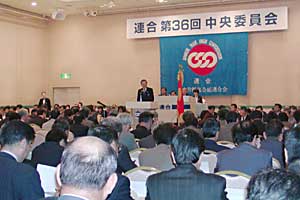|
|
Photo:
President Sasamori says,
“it’s labor unions’ turn now.” |
RENGO held its 36th Central Committee
Meeting at a hotel in Tokyo on November 13. The issues endorsed included
the “2002 Spring Struggle Policy” which establishes “a
portion to maintain wage curves plus alpha” as the uniform demand
standard, “Organization Expansion Goals 2001-2003” targeting
600,000 member expansion by September 2003, “Executive Elections
and Change Over,” the “Distribution of Awards” and
so forth. RENGO will do its utmost to seek economic recovery and job improvement
as soon as possible, led by President Sasamori, who will deploy “Action
Route 47” a tour of Japan’s 47 prefectures.
President Sasamori expressed in his speech that
“RENGO is the only organization that can push for improvement
against government reform that entirely ignores labor,” he announced
that he would face structural reform both strategically and purposefully.
Moreover, he added that, “certainly job improvement is the utmost
issue. We have understand the agony of the unemployed through our hotline
and questionnaire survey.” Sasamori declared his resolution saying,
“we will deploy Action Route 47 from November 14 and exchange
opinions with every group of people during these actions.”
Touching on the Spring Struggle he said, “we will make
the very first Spring Struggle policy that does not contain the words
‘base salary raise’ in its demands. When coping with wage
problems flexibly, the most important point is whether or not we succeed
in signing agreements that fully promise to maintain/ensure employment.”
Emphasizing that, “when we think about work-sharing, there is
a need to be prepared on the labor side, if we take the first step toward
a relation between employment and wages. Moreover, it is vital to form
a social consensus among government-labor-management.”
Further Sasamori talked about misconduct in JICHIRO (All-Japan Prefectural
and Municipal Workers’ Union.) saying, “JICHIRO should
continue to take remedial actions, cooperate fully to bring the entire
matter to light, communicate with its union members, and make every
effort to renew the organization.”
He added that, “RENGO’s organizations should not see this
misconduct as having nothing to do with it but rather as a “valuable
lesson.” Sasamori called on “officials of affiliated organizations
to act in a manner that takes to heart the fact that union dues are
paid by the sacred wages of all, including the young, union members.”
Proceeding with the agenda, the meeting newly elected Deputy President
Sakakibara (from NIKKYOSO: Japan Teachers’ Union), Vice President
Maruyama (KOKKO-RENGO: Japan Public Sector Union), Central Executive
Committee member Toda (NIKKYOSO) and endorsed the “2002 Spring
Struggle Policy” and “Organization Expansion Goals 2001-2003.”
Finally, the meeting adopted an appeal to “make ardent efforts
to meet every worker’s expectations in order to eradicate unemployment
and stabilize and create jobs.” President Sasamori then closed
the session leading the audience with three strong cheers.
|
